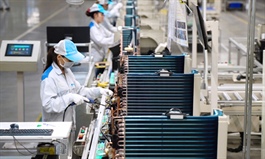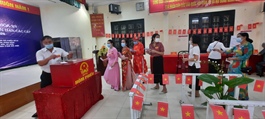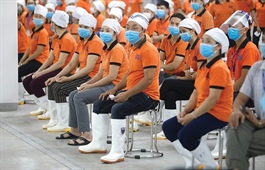FDI disbursement surges in five months
FDI disbursement surges in five months
Disbursement of foreign direct investment (FDI) to Viet Nam rose by 6.7 compared to 2020 to US$7.15 billion in the first five months of this year, a report of the Ministry of Planning and Investment has shown. 
New investment capital registered by foreign businesses in the country also saw a modest yearly rise of 0.8 per cent to nearly $14 billion in the same period.
Of the sum, about $8.83 billion went to 613 newly-licensed projects, up 18.6 per cent year-on-year, while $3.86 billion was added to 342 existing projects, up 11.7 per cent.
Capital contributions and share purchases by foreign investors fell 56.3 per cent to $1.31 billion.
Investors poured money into 18 sectors in five-months, in which processing and manufacturing took the lead with $6.14 billion, accounting for 44 per cent of the total. Power generation and distribution came next with $5.43 billion or equivalent to 39 per cent, followed by real estate with $1.05 billion and wholesale and retail sales with $522 million.
From January to May, Singapore was Viet Nam's largest source of FDI with $5.26 billion, making up nearly 38 per cent of the total FDI registered in the country. It was followed by Japan with more than $2.59 billion and South Korea with $1.83 billion.
The report added that localities luring the most FDI were the Mekong Delta province of Long An with $3.35 billion, HCM City with $1.34 billion and the Mekong Delta’ Can Tho City with $1.32 billion.
As of May 20, the country was home to 33,615 valid foreign-invested projects with a combined investment capital of $396.86 billion. Of the total, 60.5 per cent or $240 billion was disbursed.
Various incentives for foreign investors have been launched, along with opportunities brought about by new generation free trade agreements Viet Nam has signed.
The Government has also exerted efforts in administrative reforms and in improving the investment climate.
Meanwhile, relevant agencies have been advised to call for investment from multinational corporations with strengths in capital and technology, helping domestic companies access modern technologies and work with foreign counterparts in further joining global value chains.
Localities have been urged to revise their legal documents and investment policies to address any inconsistencies and should take the initiative in choosing projects that match their own potential and investment orientation.
Priority should be given to hi-tech, energy and space-saving, and environmentally-friendly projects, according to experts.


























